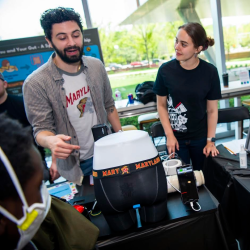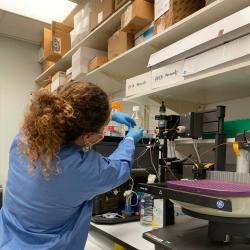Kevin McIver Named Chair of UMD’s Department of Cell Biology & Molecular Genetics for Five-year Term
McIver has served as interim department chair since March 2021.
Professor Kevin McIver will begin a five-year appointment as chair of the University of Maryland’s Department of Cell Biology and Molecular Genetics (CBMG) on July 1, 2022.

Since March 2021, McIver has served as interim chair of the department, which has over 70 tenured/tenure-track and professional-track faculty members and annual research funding of over $9 million. The department also supports, administers and advises students in the biological sciences undergraduate and graduate programs.
“As interim chair, Dr. McIver has shown that he will work collaboratively with the department's faculty, staff and students to advance our biological sciences educational programs and enhance our research enterprise,” said Amitabh Varshney, dean of the College of Computer, Mathematical, and Natural Sciences.
As interim chair, McIver oversaw the department during the peak of the SARS-CoV-2 pandemic and the transition back to in-person courses and labs. He also worked to keep the department’s research active and funding strong, despite the pandemic restrictions, which included several faculty members receiving funding for collaborative research projects to study COVID.
Over the past few months, McIver has worked with the chairs of the Department of Biology and Department of Entomology to begin the process of reorganizing the administrative structure for the biological sciences undergraduate program from college to interdepartmental oversight.
“I’m humbled and excited for the opportunity to guide this outstanding department for the next five years,” McIver said. “Serving as interim chair during the pandemic has given me the real-world experience and determination to be a positive force in helping CBMG continue to improve and be successful at all levels in its teaching, research and service missions.”
As chair, one of McIver’s major goals will be to increase the impact and excellence of the department by recruiting outstanding and diverse faculty members in areas that enhance and expand the department’s core research strengths as well as address today’s most pressing challenges.
“I’m particularly eager to help build on an already strong, interactive environment in CBMG that is highly conducive to collaborative and interdisciplinary research by seeking to diversify our funding sources and competing for larger multi-investigator programmatic grants with other departments and institutes,” McIver added.
He will also advocate for campus support of state-of-the-art core research facilities in the life sciences on campus that combine impactful new technologies with proven instrumentation as a way to synergize research efforts and recruit outstanding new faculty both to CBMG and the campus.
During his tenure as chair, McIver will continue to strengthen the undergraduate and graduate programs in the biological sciences through administrative reorganization, investment in people and spaces, a focus on pedagogy, and by building a community that supports a student’s well-being. He will also engage alumni, private donors and corporate partners to support the department’s teaching and research efforts, as well as cultivate an awareness of diversity, equity, and inclusion issues with faculty, staff, and students, with a focus on improving overall diversity through hiring, retention and communal support.
McIver joined the department as an associate professor with tenure in 2006 and was promoted to professor in 2014. He served as associate chair of the department from 2018 to 2021. Prior to joining UMD, he was an assistant professor in the Department of Microbiology at the University of Texas Southwestern Medical Center.
During his career, McIver has mentored over 40 undergraduate, master’s and doctoral students and postdoctoral fellows. Since 2016, he has served as co-director of a Ruth L. Kirschstein National Research Service Award Institutional Research Training Grant (T32) from the National Institutes of Health. The training grant supports graduate students studying host-pathogen interactions at UMD. McIver also led the biological sciences graduate program’smolecular and cellular biology concentration area from 2012 to 2015.
McIver’s research focuses on understanding how pathogens—like the bacteria Streptococcus—cause infectious diseases and avoid human immune responses. He uses genomics, genetic screens and animal models of infection to study the molecular mechanisms that underlie the interaction between pathogens and their human host during infection, such as the regulation of virulence factors produced by pathogens that are critical for disease and immune evasion. His work has been published in more than 60 refereed journal articles. McIver currently serves on the editorial advisory board for the journals Molecular Microbiology and Infection and Immunity.
After earning his bachelor’s degree in biology and computer science from James Madison University in 1985, McIver received his Ph.D. in bacterial genetics and microbiology from the University of Tennessee’s Health Sciences Center in 1994. After that, he was a postdoctoral fellow and senior research associate at Emory University.







